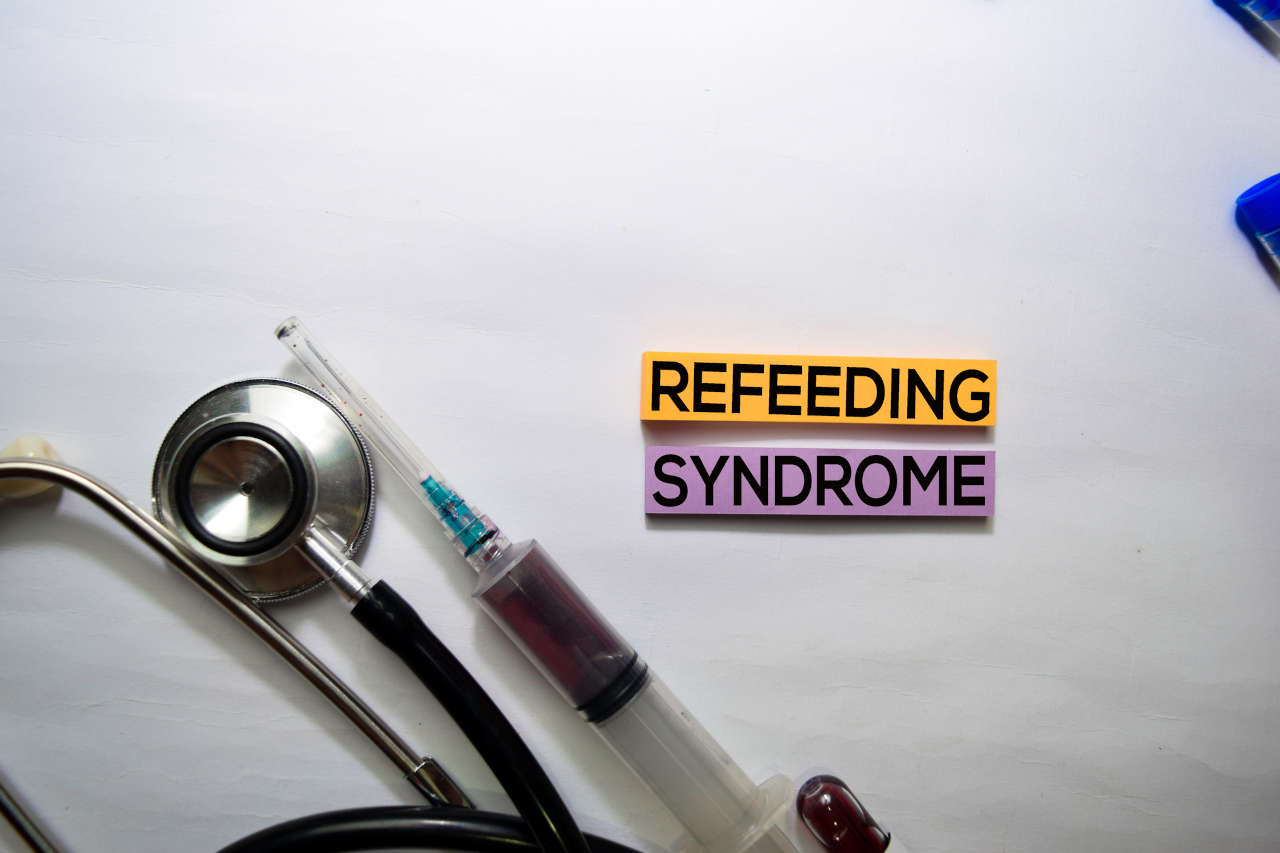
¿Sabías que comer repentinamente después de un largo período de desnutrición, dietas extremas o inanición puede ser mortal? Esta es una afección grave conocida como síndrome de realimentación.
Siempre en stock
Inventario completo de fluidos intravenosos, listo para ustedUn estudio demostró que la tasa de mortalidad en personas con síndrome de realimentación fue de 71%. Esta afección puede presentarse en cualquier persona a cualquier edad. Por lo tanto, es fundamental realizar una evaluación nutricional adecuada y recibir un seguimiento estrecho por parte de profesionales de la salud después de un período prolongado de ayuno, independientemente del motivo.
En este artículo, discutiremos todos los detalles sobre qué es el síndrome de realimentación y sus causas, síntomas, tratamiento y prevención.
¿Qué es el síndrome de realimentación y cómo se produce?
El síndrome de realimentación es un conjunto de síntomas que se presentan cuando una persona gravemente desnutrida o con privación de nutrientes recibe repentinamente carbohidratos y alimentos ricos en nutrientes. El síndrome de realimentación se produce debido al cambio repentino en los fluidos corporales y electrolitos porque tiene que cambiar sus mecanismos para convertir los nutrientes en energía.
Normalmente, nuestro cuerpo utiliza la energía de los nutrientes e ingredientes esenciales de los alimentos que ingerimos, como carbohidratos, fibra, vitaminas y proteínas. Pero cuando dejamos de comer repentinamente, por ejemplo, en caso de inanición, desnutrición o ayuno, el cuerpo utiliza los carbohidratos, las grasas y las proteínas almacenadas como fuentes de energía. Las reservas de electrolitos del cuerpo también se agotan y la cantidad de insulina que secreta el cuerpo disminuye.
Al reanudar la alimentación, el cuerpo debe cambiar su mecanismo de uso de macronutrientes almacenados (p. ej., azúcares, grasas, proteínas) para obtener energía a uso de los nutrientes de los alimentos para obtener energía. Este cambio repentino del metabolismo de las grasas al de los carbohidratos provoca un conjunto de síntomas denominados síndrome de realimentación.
Síntomas del síndrome de realimentación

Los síntomas del síndrome de realimentación pueden variar de una persona a otra. Sin embargo, los síntomas típicos incluyen:
- Confusión
- Fatiga
- dificultad para respirar
- convulsiones
- Nivel alto de azúcar en la sangre
- Hipertensión
- Debilidad
- Insuficiencia cardíaca aguda
- Coma o muerte
El síndrome de realimentación también puede provocar niveles bajos de electrolitos, como niveles bajos de potasio, magnesio y fosfato, que pueden causar los siguientes síntomas:
- micción excesiva
- Parálisis
- Frecuencia respiratoria lenta
- Paro cardiaco
- Obstrucción en el intestino (íleo)
- Náuseas y vómitos
- Debilidad y fatiga
- ritmos cardíacos anormales
- niveles bajos de calcio
Dado que los niveles bajos de electrolitos pueden poner en riesgo la vida de las personas con síndrome de realimentación, generalmente los proveedores de atención médica controlarán de cerca los niveles de electrolitos en sangre y los repondrán según sea necesario.
Pregunte por TPN Infusión en casa
Factores de riesgo del síndrome de realimentación
Los siguientes factores pueden aumentar los riesgos de síndrome de realimentación cuando se vuelve a administrar alimento.
- Si usted ha consumido continuamente muy pocos alimentos ricos en carbohidratos, grasas, calorías, proteínas y fibras durante los últimos 10 días o más y de repente comienza a ingerir comidas adecuadas y regulares.
- Si usted padecía alguna enfermedad crónica y no podía consumir alimentos adecuados y mantener una dieta saludable.
- Si perdió más de 15% de peso en los últimos 3 a 6 meses.
- Si tiene niveles bajos de potasio, magnesio o fosfato en la sangre, esto se puede comprobar mediante un análisis de sangre.
Otros factores de riesgo incluyen:
- Desnutrición
- Anorexia nerviosa
- diabetes no controlada
- Cirugía reciente
Dos o más de los siguientes factores también pueden aumentar los riesgos del síndrome de realimentación:
- A IMC (índice de masa corporal) menor de 18,5
- Antecedentes de trastorno por consumo de alcohol o uso de ciertos medicamentos a largo plazo, como diuréticos, insulina, antiácidos o medicamentos de quimioterapia.
- Perder más de 15% de su peso corporal en los últimos 3 a 6 meses.
- Consumir muy poca comida de manera constante durante los últimos 5 días o más.
Diagnóstico del síndrome de realimentación
El diagnóstico del síndrome de realimentación implica la combinación de:
- Historial médico: El proveedor de atención médica debe identificar y evaluar el historial de enfermedad del paciente, la condición médica subyacente y el estado nutricional, incluido cualquier período reciente de ayuno, desnutrición o ingesta severamente restringida de carbohidratos o calorías.
- Un examen físico completo del paciente: Evalúe el estado general de salud del paciente y verifique si hay signos de desnutrición, desgaste muscular, debilidad, temblores, retención de líquidos, irregularidades cardíacas u otros signos relacionados con el síndrome de realimentación.
- Pruebas de laboratorio: Las pruebas de laboratorio incluyen hemograma completo El hemograma completo (HC), la medición de electrolitos, las pruebas de función hepática, la glucemia y las pruebas de función renal. La evaluación de los niveles sanguíneos de nutrientes, vitaminas y minerales también es crucial para identificar el síndrome de realimentación.
- ECG (electrocardiograma): El ECG se realiza para evaluar las funciones cardíacas y detectar cualquier anomalía cardíaca.
Tratamiento
Si un paciente experimenta signos de síndrome de realimentación y tiene factores de riesgo importantes, como pérdida de peso, desnutrición, ayuno o inanición durante períodos prolongados, es fundamental controlar primero los niveles de electrolitos, los análisis de orina y sangre, las funciones corporales y realizar una evaluación general de su estado de salud hasta su recuperación completa.
El tratamiento del síndrome de realimentación incluye la administración intravenosa de electrolitos y vitaminas. Las infusiones de electrolitos de potasio, magnesio y fosfato suelen ser lentas y las dosis se calculan en función del peso corporal. La reposición de sodio debe supervisarse cuidadosamente, especialmente en pacientes con complicaciones cardíacas o cardiopatías.
Las personas con problemas respiratorios podrían requerir ventilación y suministro de oxígeno adecuados. El tratamiento del síndrome de realimentación varía según las necesidades individuales y se realiza según los síntomas del paciente.
Cuidado especializado AmeriPharma®
Nutrición Parenteral Total | Líder en Asistencia TPNPrevención
El consejo más importante para prevenir el síndrome de realimentación es controlar los factores de riesgo que pueden causar esta afección. A continuación, se presentan algunas maneras comunes de prevenir el síndrome de realimentación o sus factores de riesgo:
- Las personas con alto riesgo de desnutrición deben ser evaluadas y tratadas previamente. Nutrientes intravenosos, ciertas vitaminas y suplementos alimenticios o bebidas deben administrarse bajo la supervisión de un profesional médico si no es posible la ingesta adecuada de alimentos por vía oral.
- Si una persona ha estado en ayunas o ha perdido peso, no debe reanudar la dieta de forma abrupta. Deje que su cuerpo se adapte gradualmente a una alimentación normal, comenzando con comidas ligeras y bajas en carbohidratos.
- Evaluación periódica mediante análisis de sangre y monitoreo de los niveles de electrolitos si se usa alcohol o ciertos medicamentos (por ejemplo, antiácidos, medicamentos de quimioterapia, diuréticos) durante un período prolongado y si la persona tiene un alto riesgo de desnutrición por inanición, enfermedad crónica o pérdida de peso.













